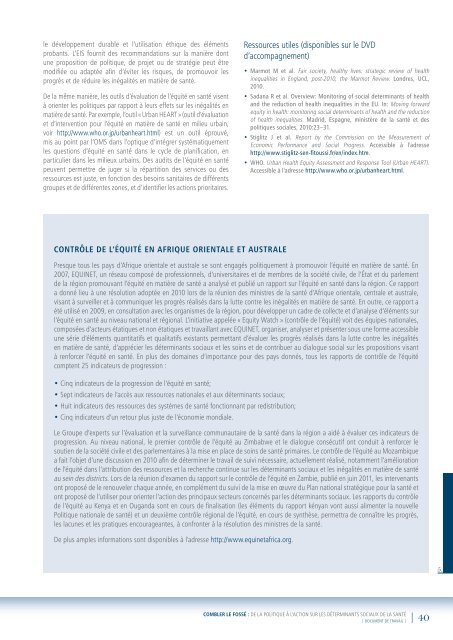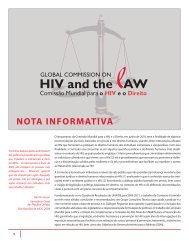Combler le fossé : de la politique à l'action sur les déterminants ...
Combler le fossé : de la politique à l'action sur les déterminants ...
Combler le fossé : de la politique à l'action sur les déterminants ...
Create successful ePaper yourself
Turn your PDF publications into a flip-book with our unique Google optimized e-Paper software.
<strong>le</strong> développement durab<strong>le</strong> et l’utilisation éthique <strong>de</strong>s éléments<br />
probants. l’eiS fournit <strong>de</strong>s recommandations <strong>sur</strong> <strong>la</strong> manière dont<br />
une proposition <strong>de</strong> <strong>politique</strong>, <strong>de</strong> projet ou <strong>de</strong> stratégie peut être<br />
modifi ée ou adaptée afi n d’éviter <strong>le</strong>s risques, <strong>de</strong> promouvoir <strong>le</strong>s<br />
progrès et <strong>de</strong> réduire <strong>le</strong>s inégalités en matière <strong>de</strong> santé.<br />
De <strong>la</strong> même manière, <strong>le</strong>s outils d’évaluation <strong>de</strong> l’équité en santé visent<br />
<strong>à</strong> orienter <strong>le</strong>s <strong>politique</strong>s par rapport <strong>à</strong> <strong>le</strong>urs effets <strong>sur</strong> <strong>le</strong>s inégalités en<br />
matière <strong>de</strong> santé. Par exemp<strong>le</strong>, l’outil « urban Heart » (outil d’évaluation<br />
et d’intervention pour l’équité en matière <strong>de</strong> santé en milieu urbain,<br />
voir http://www.who.or.jp/urbanheart.html) est un outil éprouvé,<br />
mis au point par l’omS dans l’optique d’intégrer systématiquement<br />
<strong>le</strong>s questions d’équité en santé dans <strong>le</strong> cyc<strong>le</strong> <strong>de</strong> p<strong>la</strong>nifi cation, en<br />
particulier dans <strong>le</strong>s milieux urbains. Des audits <strong>de</strong> l’équité en santé<br />
peuvent permettre <strong>de</strong> juger si <strong>la</strong> répartition <strong>de</strong>s services ou <strong>de</strong>s<br />
ressources est juste, en fonction <strong>de</strong>s besoins sanitaires <strong>de</strong> différents<br />
groupes et <strong>de</strong> différentes zones, et d’i<strong>de</strong>ntifi er <strong>le</strong>s actions prioritaires.<br />
CONTRÔLE DE L’ÉQUITÉ EN AFRIQUE ORIENTALE ET AUSTRALE<br />
Presque tous <strong>le</strong>s pays d’afrique orienta<strong>le</strong> et austra<strong>le</strong> se sont engagés <strong>politique</strong>ment <strong>à</strong> promouvoir l’équité en matière <strong>de</strong> santé. en<br />
2007, eQuinet, un réseau composé <strong>de</strong> professionnels, d’universitaires et <strong>de</strong> membres <strong>de</strong> <strong>la</strong> société civi<strong>le</strong>, <strong>de</strong> l’État et du par<strong>le</strong>ment<br />
<strong>de</strong> <strong>la</strong> région promouvant l’équité en matière <strong>de</strong> santé a analysé et publié un rapport <strong>sur</strong> l’équité en santé dans <strong>la</strong> région. ce rapport<br />
a donné lieu <strong>à</strong> une résolution adoptée en 2010 lors <strong>de</strong> <strong>la</strong> réunion <strong>de</strong>s ministres <strong>de</strong> <strong>la</strong> santé d’afrique orienta<strong>le</strong>, centra<strong>le</strong> et austra<strong>le</strong>,<br />
visant <strong>à</strong> <strong>sur</strong>veil<strong>le</strong>r et <strong>à</strong> communiquer <strong>le</strong>s progrès réalisés dans <strong>la</strong> lutte contre <strong>le</strong>s inégalités en matière <strong>de</strong> santé. en outre, ce rapport a<br />
été utilisé en 2009, en consultation avec <strong>le</strong>s organismes <strong>de</strong> <strong>la</strong> région, pour développer un cadre <strong>de</strong> col<strong>le</strong>cte et d’analyse d’éléments <strong>sur</strong><br />
l’équité en santé au niveau national et régional. l’initiative appelée « equity Watch » (contrô<strong>le</strong> <strong>de</strong> l’équité) voit <strong>de</strong>s équipes nationa<strong>le</strong>s,<br />
composées d’acteurs étatiques et non étatiques et travail<strong>la</strong>nt avec eQuinet, organiser, analyser et présenter sous une forme accessib<strong>le</strong><br />
une série d’éléments quantitatifs et qualitatifs existants permettant d’évaluer <strong>le</strong>s progrès réalisés dans <strong>la</strong> lutte contre <strong>le</strong>s inégalités<br />
en matière <strong>de</strong> santé, d’apprécier <strong>le</strong>s <strong>déterminants</strong> sociaux et <strong>le</strong>s soins et <strong>de</strong> contribuer au dialogue social <strong>sur</strong> <strong>le</strong>s propositions visant<br />
<strong>à</strong> renforcer l’équité en santé. en plus <strong>de</strong>s domaines d’importance pour <strong>de</strong>s pays donnés, tous <strong>le</strong>s rapports <strong>de</strong> contrô<strong>le</strong> <strong>de</strong> l’équité<br />
comptent 25 indicateurs <strong>de</strong> progression :<br />
• cinq indicateurs <strong>de</strong> <strong>la</strong> progression <strong>de</strong> l’équité en santé;<br />
• Sept indicateurs <strong>de</strong> l’accès aux ressources nationa<strong>le</strong>s et aux <strong>déterminants</strong> sociaux;<br />
• Huit indicateurs <strong>de</strong>s ressources <strong>de</strong>s systèmes <strong>de</strong> santé fonctionnant par redistribution;<br />
• cinq indicateurs d’un retour plus juste <strong>de</strong> l’économie mondia<strong>le</strong>.<br />
<strong>le</strong> Groupe d’experts <strong>sur</strong> l’évaluation et <strong>la</strong> <strong>sur</strong>veil<strong>la</strong>nce communautaire <strong>de</strong> <strong>la</strong> santé dans <strong>la</strong> région a aidé <strong>à</strong> évaluer ces indicateurs <strong>de</strong><br />
progression. au niveau national, <strong>le</strong> premier contrô<strong>le</strong> <strong>de</strong> l’équité au Zimbabwe et <strong>le</strong> dialogue consécutif ont conduit <strong>à</strong> renforcer <strong>le</strong><br />
soutien <strong>de</strong> <strong>la</strong> société civi<strong>le</strong> et <strong>de</strong>s par<strong>le</strong>mentaires <strong>à</strong> <strong>la</strong> mise en p<strong>la</strong>ce <strong>de</strong> soins <strong>de</strong> santé primaires. <strong>le</strong> contrô<strong>le</strong> <strong>de</strong> l’équité au mozambique<br />
a fait l’objet d’une discussion en 2010 afi n <strong>de</strong> déterminer <strong>le</strong> travail <strong>de</strong> suivi nécessaire, actuel<strong>le</strong>ment réalisé, notamment l’amélioration<br />
<strong>de</strong> l’équité dans l’attribution <strong>de</strong>s ressources et <strong>la</strong> recherche continue <strong>sur</strong> <strong>le</strong>s <strong>déterminants</strong> sociaux et <strong>le</strong>s inégalités en matière <strong>de</strong> santé<br />
au sein <strong>de</strong>s districts. lors <strong>de</strong> <strong>la</strong> réunion d’examen du rapport <strong>sur</strong> <strong>le</strong> contrô<strong>le</strong> <strong>de</strong> l’équité en Zambie, publié en juin 2011, <strong>le</strong>s intervenants<br />
ont proposé <strong>de</strong> <strong>le</strong> renouve<strong>le</strong>r chaque année, en complément du suivi <strong>de</strong> <strong>la</strong> mise en œuvre du P<strong>la</strong>n national stratégique pour <strong>la</strong> santé et<br />
ont proposé <strong>de</strong> l’utiliser pour orienter l’action <strong>de</strong>s principaux secteurs concernés par <strong>le</strong>s <strong>déterminants</strong> sociaux. <strong>le</strong>s rapports du contrô<strong>le</strong><br />
<strong>de</strong> l’équité au Kenya et en ouganda sont en cours <strong>de</strong> fi nalisation (<strong>le</strong>s éléments du rapport kényan vont aussi alimenter <strong>la</strong> nouvel<strong>le</strong><br />
Politique nationa<strong>le</strong> <strong>de</strong> santé) et un <strong>de</strong>uxième contrô<strong>le</strong> régional <strong>de</strong> l’équité, en cours <strong>de</strong> synthèse, permettra <strong>de</strong> connaître <strong>le</strong>s progrès,<br />
<strong>le</strong>s <strong>la</strong>cunes et <strong>le</strong>s pratiques encourageantes, <strong>à</strong> confronter <strong>à</strong> <strong>la</strong> résolution <strong>de</strong>s ministres <strong>de</strong> <strong>la</strong> santé.<br />
De plus amp<strong>le</strong>s informations sont disponib<strong>le</strong>s <strong>à</strong> l'adresse http://www.equinetafrica.org.<br />
ressources uti<strong>le</strong>s (disponib<strong>le</strong>s <strong>sur</strong> <strong>le</strong> DvD<br />
d’accompagnement)<br />
• Marmot M et al. Fair society, healthy lives: strategic review of health<br />
inequalities in eng<strong>la</strong>nd, post-2010, the marmot review. Londres, UCL,<br />
2010.<br />
• Sadana R et al. Overview: Monitoring of social <strong>de</strong>terminants of health<br />
and the reduction of health inequalities in the EU. In: moving forward<br />
equity in health: monitoring social <strong>de</strong>terminants of health and the reduction<br />
of health inequalities. Madrid, Espagne, ministère <strong>de</strong> <strong>la</strong> santé et <strong>de</strong>s<br />
<strong>politique</strong>s socia<strong>le</strong>s, 2010:23–31.<br />
• Stiglitz J et al. report by the commission on the mea<strong>sur</strong>ement of<br />
economic Performance and Social Progress. Accessib<strong>le</strong> <strong>à</strong> l'adresse<br />
http://www.stiglitz-sen-fi toussi.fr/en/in<strong>de</strong>x.htm.<br />
• WHO. urban Health equity assessment and response tool (urban Heart).<br />
Accessib<strong>le</strong> <strong>à</strong> l'adresse http://www.who.or.jp/urbanheart.html.<br />
COMBLER LE FOSSÉ : De <strong>la</strong> PolitiQue À l’action Sur <strong>le</strong>S DÉterminantS SociauX De <strong>la</strong> SantÉ<br />
| | Document De travail | 40<br />
5.



